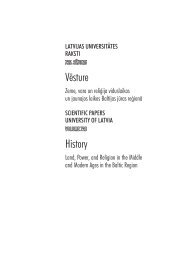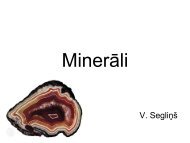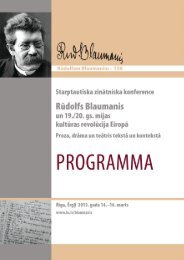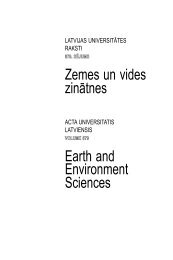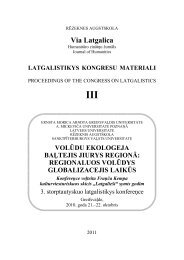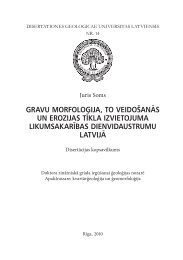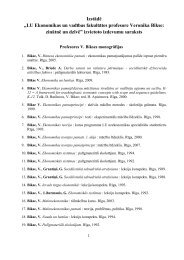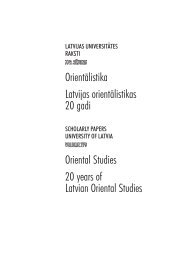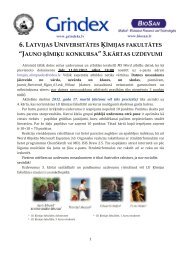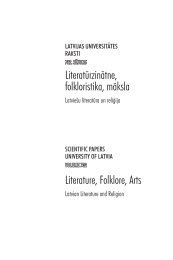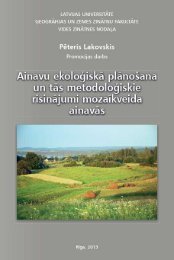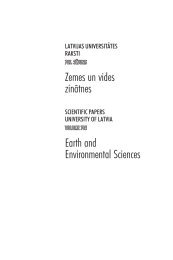Untitled
Untitled
Untitled
Create successful ePaper yourself
Turn your PDF publications into a flip-book with our unique Google optimized e-Paper software.
Sigma Ankrava. Pçckoloniâlais sindroms un identitâtes krîze Latvijâ<br />
The Soviet–type economies could pretend that they were the very embodiment<br />
of industrial modernization, still in most parts of the former<br />
USSR satellite states the Marxist–Leninist economy imprisoned an enormous<br />
number of people on in their farms. Today this reserve army creates<br />
the most serious political conflicts in Poland since the fall of communism<br />
and right at in the time when the country is trying to become an<br />
EU member state. 3<br />
The postcolonial syndrome is essentially a chain of effects provoked by drastic<br />
changes of social roles and identities. On a personal level it may often result in a<br />
profound identity crisis. Such is the case with the Polish farmers. The situation in<br />
Latvia can be characterized in similar terms.<br />
After independence was restored, the indigenous population, at least in theory, had<br />
their former rights restored, whereas the new–comers, who had arrived with the Soviet<br />
occupation troops or later, suddenly turned from ‘liberators’—a role they identified themselves<br />
with—into ‘colonizers’. Neither of the groups was ready for this kind of change.<br />
Independence this time had come to Latvia faster than people had expected. Actually,<br />
the coup of August 1991 solved the problem in a couple of days. This was the time<br />
when many non–ethnic Latvians living in Latvia supported the idea of independence,<br />
and that is why this though unofficial change of their social role was painful to them. In<br />
the past those people had arrived in in Latvia quite differently. The first group came to<br />
Latvia at the end of World War II, along with the Soviet army, convinced of their mission<br />
as li-berators, though for the local people they were just another occupation army. Then<br />
there followed the retired officers who, just in the tradition of the Roman Empire, were<br />
allowed to settle down in its the colonies and enjoy certain privileges. It is those two<br />
groups of settlers to whom it would be politically correct to apply the term ‘colonizers’.<br />
They were followed by economical refugees, – initially from regions ruined by the war,<br />
and later from regions ruined by mismanagement, and then by those who were sent there<br />
by warrants after graduating from high schools and universities. This process intensified<br />
after 1959 – it might be called the secret colonization of Latvia. Although these new–<br />
comers enjoyed the kind of privileges the local population had been denied, for instance<br />
language (Latvian at that time was a kind of a second class language), accommodation,<br />
work, career opportunities etc., they were brought to Latvia in such large numbers that<br />
the regime could not provide them with normal living conditions. They were pining away<br />
for decades in hostels and communal flats, waiting for a flat of their own, and when they<br />
were confronted with the bureaucratic state machinery their lack of rights brought them<br />
together with the local people, though the fundamental difference between the two<br />
groups remained, the difference of the psychology of a grinding–stone and a grain.<br />
Not just the people of Baltic states, but also the inhabitants of other Soviet satellite<br />
states felt like grain between grinding stones, though colonization there was<br />
more of a spiritual type. Karlis Racevskis characterised this method of colonization,<br />
i.e. the colonization of people’s minds, when he quoted Vaclav Havel:<br />
Vaclav Havel provides a most compelling description of the method that<br />
was perfected during the years of Soviet occupation in Eastern Europe.<br />
In order to suggest the insidious subtlety of a system that remained to-<br />
27



